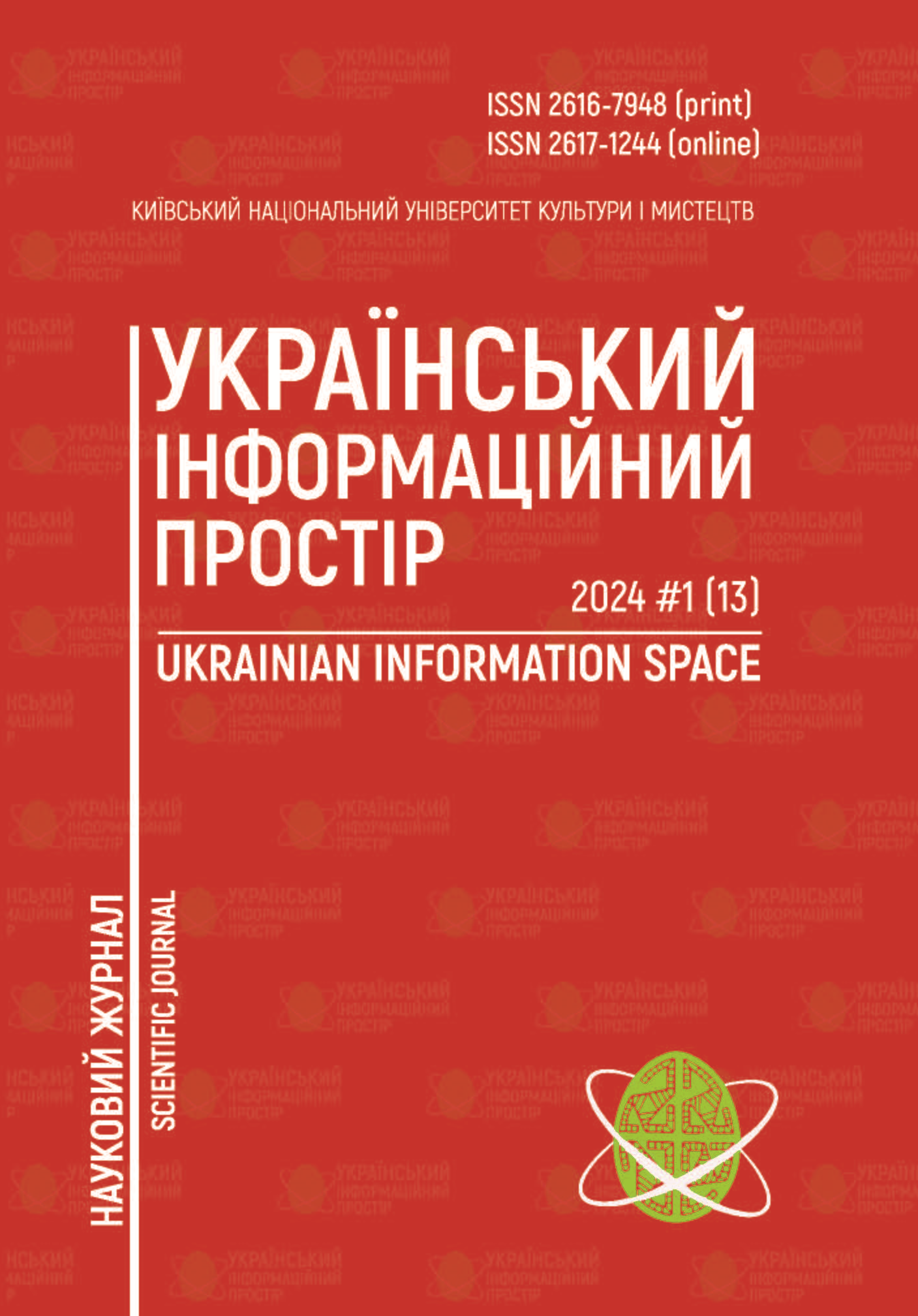Медіаграмотність як чинник захисту інформаційного простору від ворожої дезінфомації в час війни
DOI:
https://doi.org/10.31866/2616-7948.1(13).2024.300896Ключові слова:
війна та конфлікти, політична культура, дезінформація, інформаційна безпека, інформаційна культура, медіаграмотність, медіаосвіта, критичне мислення, соціальні мережіАнотація
У сучасному інформаційному суспільстві медіаграмотність відіграє важливу роль у забезпеченні правильного сприйняття медійного контенту та відповідального користування інформацією, особливо в умовах війни, коли дезінформація та маніпуляції можуть впливати на рішення та поведінку громадян. У статті досліджено суть і значення медіаграмотності в українському суспільстві під час війни. Обґрунтовано, що в процесі комунікативного розвитку людства, який розпочався із запровадженням класичної писемності та поширився на розвиток електронних засобів масової інформації, формуються навички й компетенцї, необхідні в новому комунікативному середовищі – цифровому, глобальному та мультимедійному. У результатах дослідження встановлено, що медіаграмотність постає як інформаційна зброя в боротьбі з дезінформацією та впливає на формування полікультурної картини світу, розвиток критичного мислення та навичок аналізу інформації. Розглянуто спеціальні програми й тренінги для журналістів і широкої громадськості, які сприяють підвищенню знань про медійну діяльність та виявлення дезінформації. Проаналізовано спеціальні проєкти в соціальних мережах для розвитку критичного мислення серед користувачів і виявлення маніпуляційної інформації. Закцентовано увагу на тому, як можна оновити зміст медіаосвіти, щоб він відповідав сучасним тенденціям і медійній епосі. У дослідженні доведено необхідність підвищувати рівень медіаграмотності серед населення, враховуючи особливості інформаційного простору під час війни, а також наголошено на важливості розвитку навичок критичного мислення та вмінь аналізувати медійний контент в умовах інформаційної нестабільності.
Посилання
Baker, T., & Welter, F. (2020). Contextualizing entrepreneurship theory. Routledge. https://doi.org/10.4324/9781351110631 [in English].
Bilobrovets, O., & Venherska, V. (2022). Mizhnarodna naukova konferentsiia "Viiny v Ukraini u XX i XXI st.: Zasoby masovoi informatsii, eksperty, dezinformatsiia" [International Scientific Conference "Wars in Ukraine in the Twentieth – Twenty First Centuries: Mass Media, Experts, Disinformation"]. Ukrainian Historical Journal, 6, 219–224. http://uhj.history.org.ua/doc/UIJ_2022_6_21 [in Ukrainian].
Carpentier, N. (2011). New configurations of the audience? The Challenges of User-Generated content for audience theory and media participation. In V. Nightingale (Ed.), The handbook of media audiences (pp. 190–212). Blackwell-Wiley. https://doi.org/10.1002/9781444340525.ch9 [in English].
Diachenko, M. D., & Diachenko, I. M. (2023). Osoblyvosti mediaosvity studentiv v umovakh suchasnykh vyklykiv [Peculiarities of media education of students in the conditions of modern challenges]. In Higher education in Ukraine (1991–2023): Traditions, transformations, challenges, and prospects (pp. 66–94). Baltija Publishing. https://doi.org/10.30525/978-9934-26-368-2-5 [in Ukrainian].
Jaster, R., & Lanius, D. (2021). Speaking of fake news: Definitions and dimensions. In S. Bernecker, A. K. Flowerree, & T. Grundmann (Eds.), The epistemology of fake news (pp. 19–45). Oxford University Press. https://doi.org/10.1093/oso/9780198863977.003.0002 [in English].
Jolls, T. (2022). Building resiliency: Media literacy as a strategic defense strategy for the transatlantic. Center for Media Literacy. https://is.gd/T68ey4 [in English].
Kholokh, O. I. (2016). Filosofsko-antropolohichne osmyslennia suchasnoi propahandy [Philosophical-anthropological understanding of modern propaganda]. Hileya, 114, 241–246 [in Ukrainian].
Korta, S. (2018). Fake news, conspiracy theories, and lies: An information laundering model for homeland security [Master’s Thesis, Naval Postgraduate School] [in English].
Kuzina, Ye. I. (2023). Psykholohichni mekhanizmy informatsiinoho vplyvu na osobystist dorosloi liudyny [Psychological mechanisms of information influence on the personality of an adult] [Doctoral Dissertation, Kryvyi Rih State Pedagogical University]. https://doi.org/10.31812/123456789/7441 [in Ukrainian].
Litostanskyi, V. V., Ivanov, V. F., Ivanova, T. V., Volosheniuk, O. V., Danylenko, V. I., & Melezhyk, V. P. (2014). Mediahramotnist u zapytanniakh ta vidpovidiakh: Navchalna prohrama [Media literacy in questions and answers: Curriculum]. Instytut innovatsiinykh tekhnolohii I zmistu osvity. https://aup.com.ua/uploads/prall.pdf [in Ukrainian].
Martens, B., Aguiar, L., Gomez-Herrera, E., & Mueller-Langer, F. (2018). The digital transformation of news media and the rise of disinformation and fake news. European Commission, Joint Research Centre. https://dx.doi.org/10.2139/ssrn.3164170 [in English].
Moon, J. (2007). Critical thinking: An exploration of theory and practice. Routledge [in English].
Oleksiyuk, T. (2023). Access to official information for countering disinformation: Key findings and steps for Ukrainian policy makers. UA:Ukraine Analytica, 1(30), 88–96. https://ukraine-analytica.org/wp-content/uploads/UA_Analytica_1_30_2023.pdf#page=90 %22 [in English].
Savenko, O. (2023). Zakon Ukrainy "Pro media": Istoriia ukhvalennia, pozytyvy, nedoliky, perestorohy [The law of Ukraine "On Media": The history of its adoption, positives, shortcomings, warnings]. Ukrainian Information Space, 2(12), 55–70. https://doi.org/10.31866/2616-7948.2(12).2023.291165 [in Ukrainian].
Simion, M. (2023). Knowledge and disinformation. Episteme, 20(1–4), 1–12. https://doi.org/10.1017/epi.2023.25 [in English].
Tiutiunnyk, L. L. (2023). Propahanda yak zasib manipuliatsii v umovakh viiny [Propaganda as a means of manipulation in the conditions of war]. Bulletin of National Defense University of Ukraine, 76(6), 184–192. https://doi.org/10.33099/2617-6858-2023-76-6-184-192 [in Ukrainian].
Yahodzinskyi, S. M. (2015). Hlobalni informatsiini merezhi u sotsiokulturnii perspektyvi [Global information networks in a sociocultural perspective] [Monograph]. Ahrar Media Hrup [in Ukrainian].
##submission.downloads##
Опубліковано
Як цитувати
Номер
Розділ
Ліцензія
Авторське право (c) 2024 Юрій Горбань, Оксана Олійник

Ця робота ліцензується відповідно до Creative Commons Attribution 4.0 International License.
The authors retain copyrights to the work and at the same time grant the journal the right to first publish it under the terms of the Creative Commons Attribution License, which allows other persons to freely distribute the published work with a mandatory reference to its authors and its first publication.
The journal allows the author(s) to hold the copyright without restrictions and to retain publishing rights without restrictions.
The author of the published article has the right to distribute information about it and to post references to work in the electronic repository of the institution.




